When it comes to storing apples and oranges, the primary concern I hear from many people is whether they should be stored together.
Can apples and oranges be stored together?
Apples and oranges should not be stored together because they can affect each other’s shelf life. Ethylene-releasing compounds produced by apples can cause the deterioration of oranges.
How you store these fruits determines how long they can last. Read on to learn how to properly store apples and oranges, and the measures you can take when handling apples with other citrus.
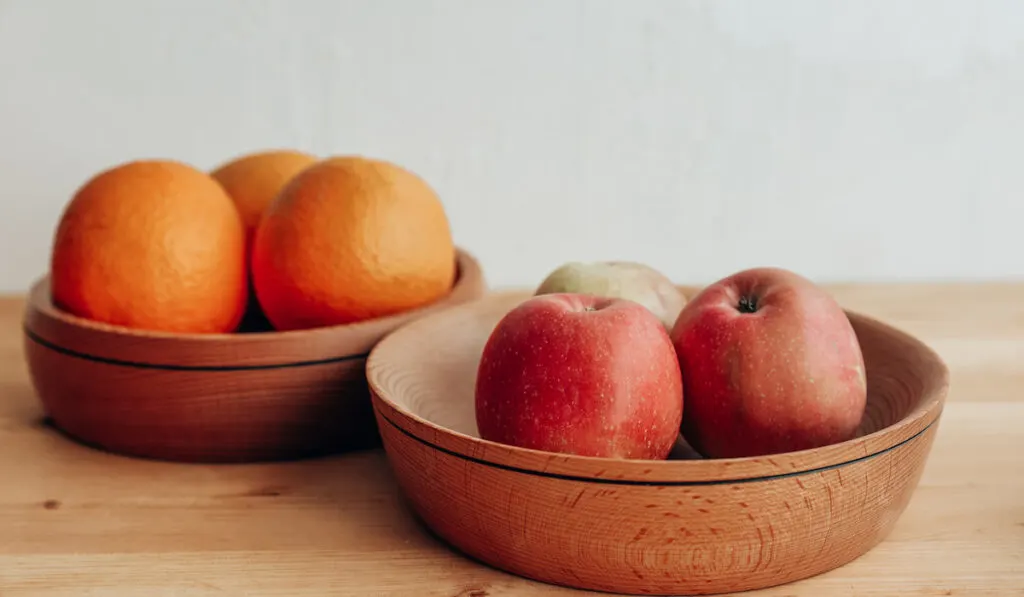
Table of Contents
Why You Shouldn’t Store Apples and Oranges Together
Apples and oranges differ in color, appearance, flavor, juiciness, weight, peel thickness, and how they are eaten.
However, a lot goes on within the peel, which determines their ability to be stored together.
Apples are one of the few fruits that produce high amounts of ethylene.
Ethylene is a plant hormone that triggers the ripening of fruits and vegetables.
The concentration of this gaseous hormone is low in unripe fruits but high in harvested fruits. It tends to reduce the shelf life of fruit as it exposes fruit to pathogens.
Since ripe apples produce higher amounts of ethylene than oranges, the gas can ripen oranges, thereby spoiling them quickly. Also, flavor crossover is likely to happen, affecting the taste of both fruits.
For the above reasons, storing the two fruits separately is best to maintain their quality.
The Best Way to Store Apples
To maintain the flavor and crunch of freshly picked apples, you may have to do everything necessary to store them appropriately.
The following tips can help you preserve your apples for three-plus months:
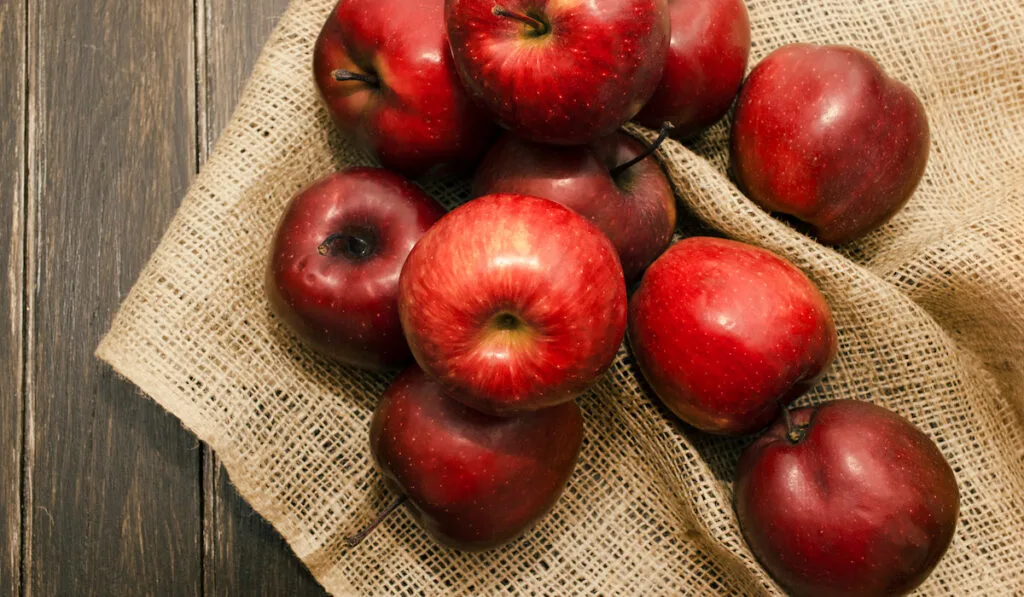
Tip 1: Don’t Wash the Apples
You may be tempted to wash your apples after bringing them home from the store.
However, doing this would mean washing off the food-grade wax (shellac) applied to protect them from spoiling.
Washing your apples before storing them would speed up their deterioration while in storage.
Also, you might unknowingly damage the apples while washing them. A damaged apple or two may spoil the rest, which is something you don’t want to encounter.
Tip 2: Keep Them in a Cool, Dry Place
You want to use a dry, air-tight container or bag to store apples.
Assess your apples one by one as you put them in the container to ensure that each is in perfect shape. If you notice a wet apple, wipe it dry before putting it in the container.
Also, it’s important to sort the apples according to their state. Separate clean, undamaged apples from those slightly damaged by putting them in different containers.
Damaged apples produce a high amount of ethylene gas that may spoil the entire bunch.
Tip 3: Store Them Separately
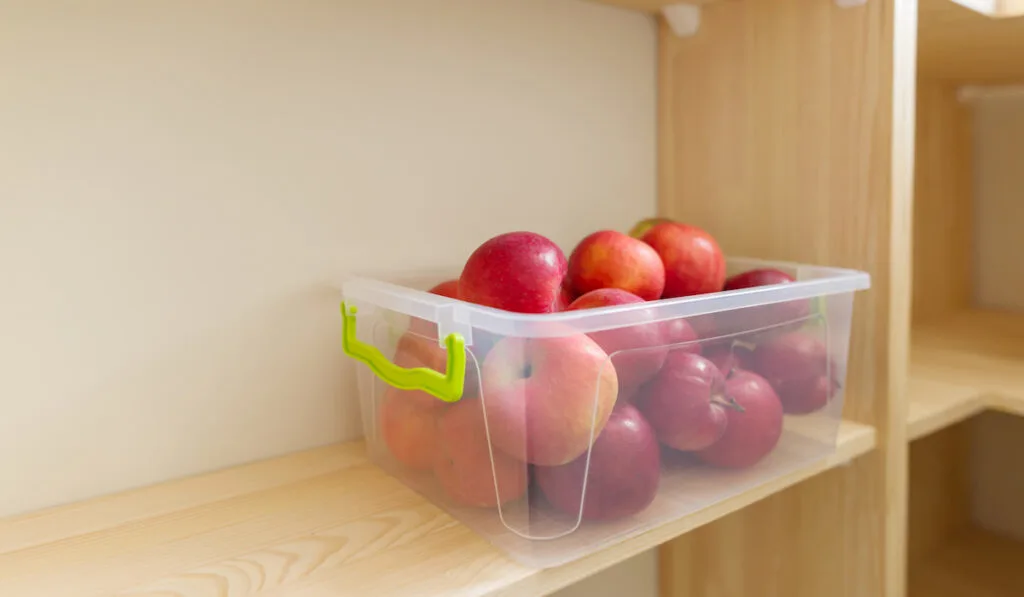
Another thing to keep in mind is storing your apples in a separate container from other fruit.
As much as you might be tempted to save space by storing your apples with other fruits, this can only harm the fruits in the long term.
Tip 4: Use Produce Saver
Once you have your apples sorted and in the container, putting in a produce saver before sealing the container can help significantly.
Produce savers can absorb the ethylene gas produced by fruits, thereby lengthening their shelf life.
You can try out the BluApple Produce Saver , as it’s designed to keep your fruits and vegetables fresh. Plus, it’s refillable and easy to use.
From here, seal the container, and your apples will be ready for storage.
Tip 5: Maintain an Appropriate Temperature
To prolong shelf life, ensure you store apples at a temperature between 32°F and 36°F, with a relative humidity of around 90 to 95 percent.
The refrigerator can be a good option if you only have a few apples. But a cool, dry place will do if you have a larger quantity.
Additionally, store apples with their stems and use crates or bins to sort them.
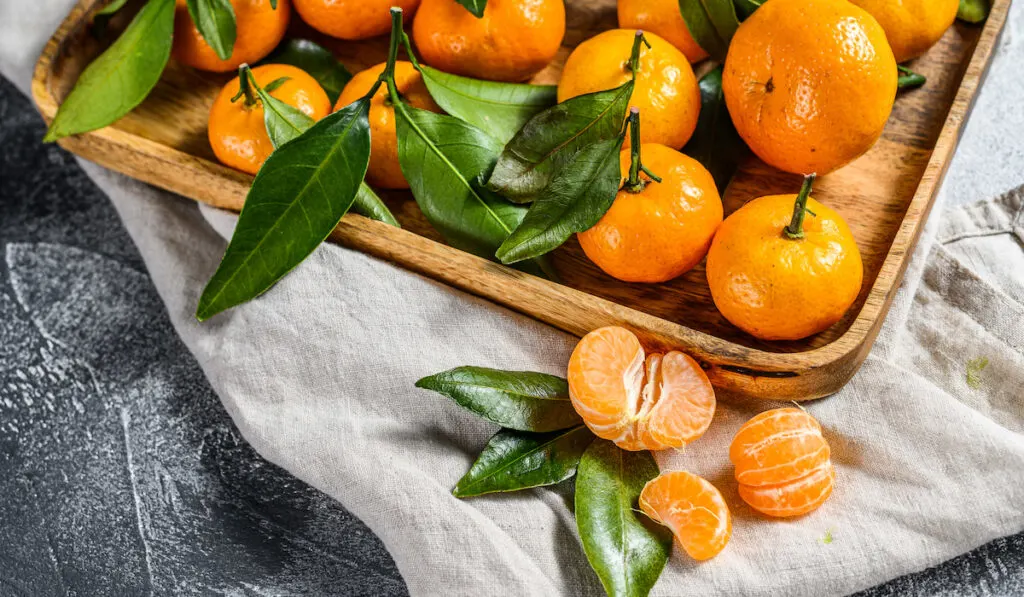
The Best Way to Store Oranges
Properly stored oranges can keep you going for months. The following tips can help you achieve this:
Tip 1: Unwrap the Packaging
If you’ve bought oranges wrapped in a plastic bag, the first thing you want to do when you get home is to unwrap them: Mold tends to form on the oranges when they are wrapped in plastic for a long time.
Tip 2: Sort the Oranges
It’s also important to inspect each orange to ensure they are free of dents and blemishes to prevent them from ruining the rest.
If you notice any juice in the bag, there is a bad orange somewhere that you need to dispose of.
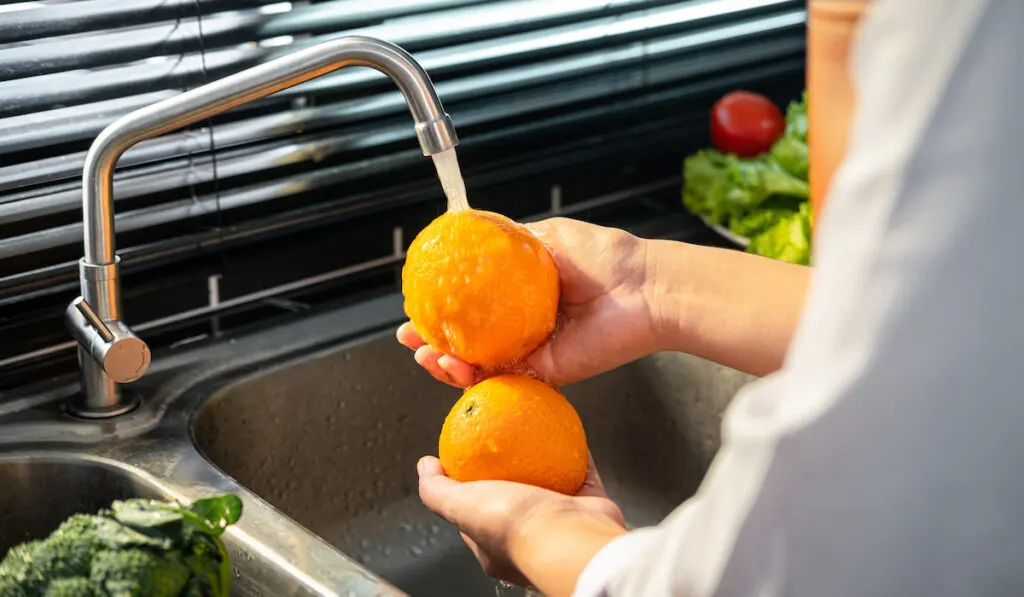
Tip 3: Clean the Oranges (Optional)
You can wash the oranges with water and then dry them completely. Another alternative is wiping them with vinegar to kill bacteria or mold.
Tip 4: Find an Ideal Temperature
Since oranges are non-climacteric fruits, it’s best to store oranges in a well-ventilated area for uniform cooling and prolonged shelf life.
The best place to store your oranges is in the refrigerator.
This will help them last several weeks.
Like apples, oranges can also do well at 90 to 95 percent relative humidity. But their ideal storage temperature is between 40 to 50 degrees F.
If you have cut oranges, wrap them separately with plastic wrap and place them in an airtight container.
Avoid overfilling the containers to ensure good airflow.
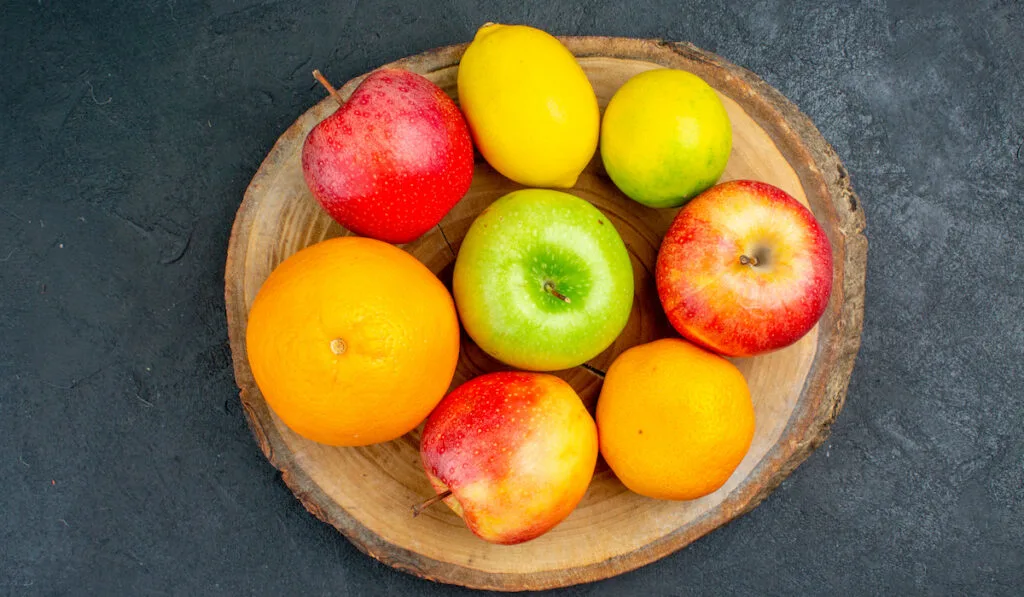
Can Apples Be Stored With Other Citrus?
You can store apples with other citrus fruits without experiencing adverse effects.
Grapefruits aren’t ethylene-sensitive, so they are safe near apples.
However, keep fruits like tangerines, pomelos, sudachi, limes, and lemons separate from apples to protect them.
In addition, you may want to implement these measures when storing apples with other citrus fruits:
- If you intend to keep your citrus for long, store them in separate containers to protect them from the effects of ethylene gas produced by apples.
- Citrus and apples are best stored in a cool and dry area. The storage space should be adequately ventilated to prevent premature spoilage.
- Inspect the fruits regularly and remove spoiled ones to save the rest from decay.
Final Remarks
While storing apples and oranges together may be tempting, keeping them separately is highly recommended to prevent one from affecting the other.
Apples are high ethylene-gas producers, which can shorten the lifespan of other fruits, including citrus fruits like limes, tangerines, and lemons. For this reason, following the storage tips mentioned above can help you preserve your fruits longer.
Resources:
- https://www.gardeningknowhow.com/edible/fruits/fegen/ethylene-gas-information.htm
- https://www.washingtonpost.com/food/2022/05/31/fruit-vegetable-storage-ethylene/
- https://www.psu.edu/news/agricultural-sciences/story/your-produce-may-be-getting-gassed-refrigerator/
- https://extension.umd.edu/resource/ethylene-and-regulation-fruit-ripening
- https://www.afsuter.com/product-category/industry/food-agriculture/
- https://www.fao.org/3/ae075e/ae075e21.htm
- https://www.canr.msu.edu/news/storing-apples-in-converted-storage-space
